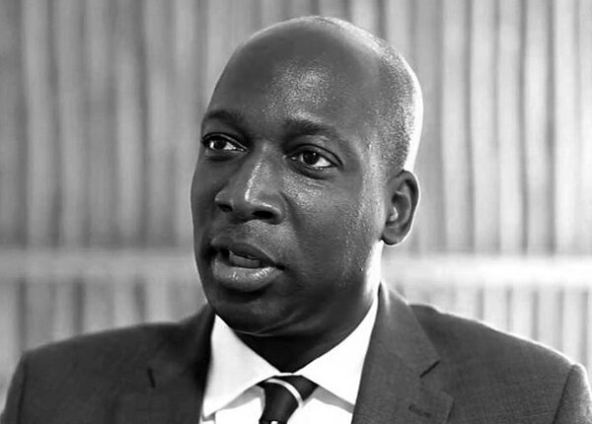A former Executive Vice President of Unilever, Yaw Nsarkoh, says coups are not the solution to addressing developmental issues in a country, and thus discouraged support for coup makers.
Speaking on PM Express on JoyNews, he explained that just because coups are referred to as military takeovers does not mean they are derived from a decision taken by the entire army of a country to foster development.
Mr Nsarkoh said the decision is taken by a select few who have no mandate and want to seize power for themselves and subsequently do not account to the people when they are at the helm of affairs.
“Coups are an intellectually lazy approach for people who do not want to do the hard political work. And we must absolutely never outsource the political work that is required for development to coup makers.”
“Let us place a magnifying glass over a coup. A coup is not the military acting as an establishment. Coup by definition is a click of conspiratorial elements of the military. It's not the full military acting as an establishment. And then they get up and they say that we feel that we must intervene now. And then you have people who are applauding them and saying that the civilians have not delivered and therefore we must try them.”
Mr Nsarkoh stated that just because issues are not getting resolved among others in a country does not mean having a coup is the answer to the problem.
“Why do we now believe that things are so binary that we must choose between corrupt civilians or soldiers who are not accountable?”He quizzed, adding that there are countries that faced lots of issues including corruption among others but never resorted to coups.
“The challenge I throw is that Kamuzu Banda was also in power for three decades or so, the Malawian people got rid of him without a coup. Kenneth Kaunda in Zambia, they got rid of him without a coup. So if you're willing, it is the more difficult route. But you see, this new liberal environment encourages us, we're always looking for shortcuts.”
“Our forebears many years ago used to say there is no shortcut to the top of the palm tree. What they were telling us is that if we want enduring change in society, you have to work hard for it,” Mr Nsarkoh added.
This comment comes after a number of recorded coups in Africa over the last three years.
Africa’s history of coups in the last three years
In August 2020, there was a coup in Mali and although constitutional rule was restored, the military took over power again nine months later in May 2021.
More than two years later, the junta is yet to hand over power. The military leaders have however promised to return the country to constitutional rule after elections scheduled for February 2024.
In September 2021, Guinea’s President Alpha Condé was overthrown and two years later the country is still under military rule.
In October 2021, General Abdel Fattah al-Burhane chased out the transitional civilian leaders, who were supposed to lead the country towards democracy after 30 years of Omar al-Bashir’s dictatorship.
In January 2022, the military in Burkina Faso, Ghana’s neighbouring country, overthrew President Roch Marc Christian Kaboré. A year and a half later, the military is still ruling but a presidential election has been scheduled for July 2024.
The military in Niger on July 26, 2023, announced the overthrow of President Mohamed Bazoum. General Abdourahamane Tiani is now the new leader. ECOWAS placed sanctions on the country and has threatened military action should all diplomatic talks fail.
But, the junta is insisting on a three-year transition plan despite ECOWAS’ call for a constitutional rule as soon as possible.
Lastly, on August 30, 2023, the army overthrew President Ali Bongo shortly after he was declared the winner of a disputed election.
Subsequently, the head of the military junta in Gabon, Gen Brice Oligui Nguema, was sworn into office as the interim president of the country.
Latest Stories
-
Money Summit: Fidelity Bank’s Atta Gyan calls for a rethink on investment strategies
5 mins -
WPL 2023/24: Battle for glory as Northern and Southern zone clubs chase playoff spots
13 mins -
Ghana’s Press Freedom Index improvement nothing to write home about – Sam George
20 mins -
Ghana Wellness and Healthcare Awards slated for June 14
23 mins -
OSP begins investigation into alleged bribery of EC staff by Kwadaso MP
28 mins -
Ghana FA laud Coach Zito with standing ovation after Dreams FC’s exploit in Africa
30 mins -
Asantehene worried over brain drain in African contemporary arts
34 mins -
Hearts of Oak legend berates current players for poor form
53 mins -
Unless EC has rules against officials receiving lunch money, nothing can be done in ‘envelope scandal’ – Prof Agyeman Duah
57 mins -
Singer Ayra Starr releases artwork, track list for ‘Sophomore Album’
1 hour -
Actress Sola Sobowale debunks drug trafficking and arrests in Saudi Arabia
1 hour -
Zebra on loose after escape in US mountain country
1 hour -
Apple iPhone sales fall in nearly all countries
2 hours -
Bawumia takes campaign tour to Western Region
2 hours -
Ghana and India discuss trade at the fourth JTC meeting
2 hours

